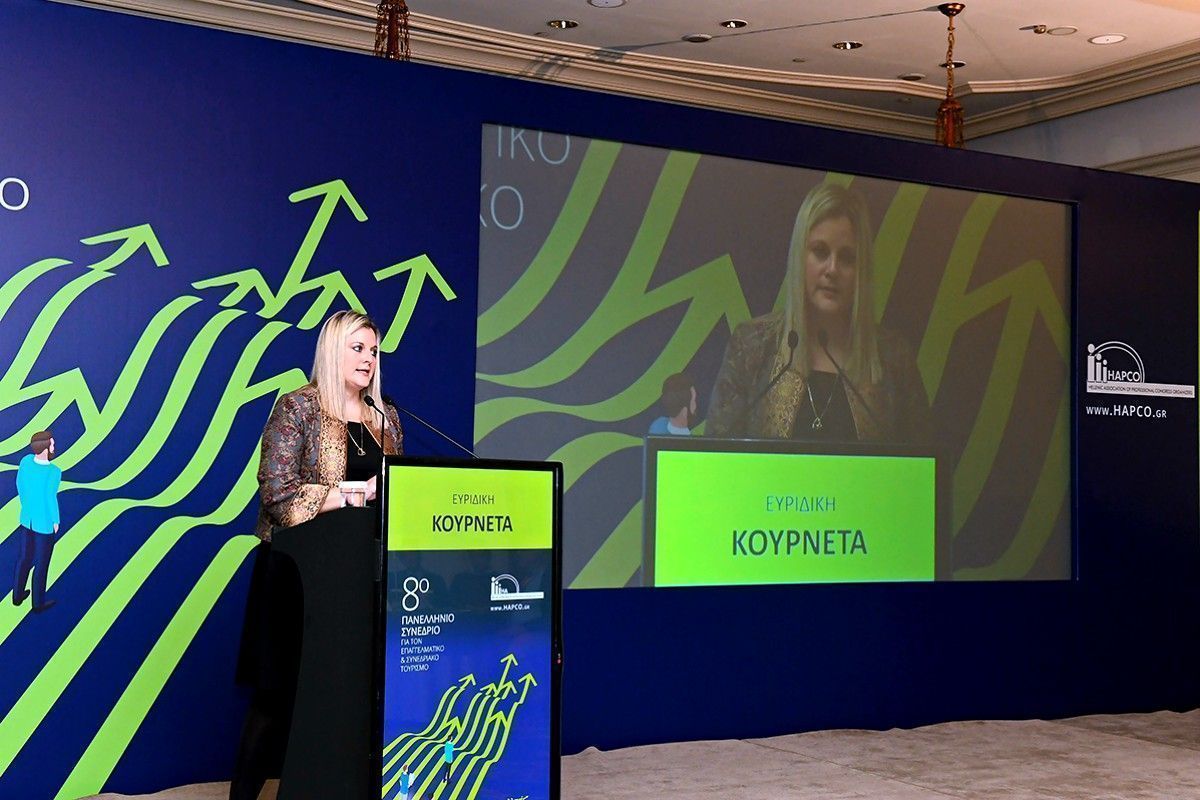Ministry Plans to Support Conference Tourism in Greece
 The Tourism Ministry on Wednesday announced plans to support the development of conference tourism in Greece, which include the creation of a National Conference Registry.
The Tourism Ministry on Wednesday announced plans to support the development of conference tourism in Greece, which include the creation of a National Conference Registry.
Speaking during the 8th Panhellenic Conference of the Hellenic Association of Professional Congress Organizers (HAPCO), the Secretary General of Tourism, Evridiki Kourneta, said that the ministry aims to work together with all stakeholders to implement a common strategy to promote conference tourism internationally.
“We are preparing a roadmap that includes the terms and conditions so that conference tourism, more resilient than leisure tourism, will be one of the most developing and dynamic sectors for the Greek tourist product,” she said, adding that the ministry aims to promote Greece internationally as a safe, reliable, hospitable and attractive tourist destination with high standard conference facilities for tourism 365 days a year.
Creation of a National Conference Registry
 When referring to the ministry’s planned strategic interventions for the development of conference tourism, Kourneta said that the ministry will see to create a National Conference Registry to ensure a clear picture of the number of hosted conferences and their organizers.
When referring to the ministry’s planned strategic interventions for the development of conference tourism, Kourneta said that the ministry will see to create a National Conference Registry to ensure a clear picture of the number of hosted conferences and their organizers.
The creation of a conference registry has been among the main requests of Greek professional conference organizers (PCOs) for years as it would ensure accurate statistics (number of delegates, sponsors/exhibitors or accompanying members, country of origin and the revenue gained from services such as accommodation and catering services) on the number of conferences hosted in Greece.
The existence of a registry will also allow the state to collect all indirect or direct taxes and monitor VAT payments. Moreover, the organization of conferences by the sector’s certified professionals/entrepreneurs would be protected.
Supporting PCOs and other interventions
During her speech, Kourneta said the ministry plans to support Greek PCOs in their bids for Greece to host international conferences of more than 3,000 participants.
 The ministry also plans to support conference and exhibition tourism in the wider areas of Greece’s city centers, in developed tourist areas and in destinations under development that are easily accessible (mainly by air and road) and have opportunities for activities for delegates.
The ministry also plans to support conference and exhibition tourism in the wider areas of Greece’s city centers, in developed tourist areas and in destinations under development that are easily accessible (mainly by air and road) and have opportunities for activities for delegates.
According to the secretary general, the ministry will aim to create small scale conference or exhibition facilities in smaller urban centers and other tourist destinations, based on criteria including their close distance to universities and historical sites or their involvement with sports and cultural events.
The ministry is also looking to improve the attractiveness of cities and tourist destinations through the upgrading of existing facilities — as well as the creation of new ones — that are either purely focused on conferences or exhibitions or combined with high accommodation standards.
Furthermore, Kourneta said the ministry also has plans to convert large indoor sports facilities into conference and exhibition venues; integrate new technologies into conference or exhibition tourism facilities; and link conference tourism with other forms of tourism such as cultural, city tourism, cruise and gastronomy.
According to the International Congress and Convention Association (ICCA), Greece ranks 25th globally for hosting conferences and conventions.





